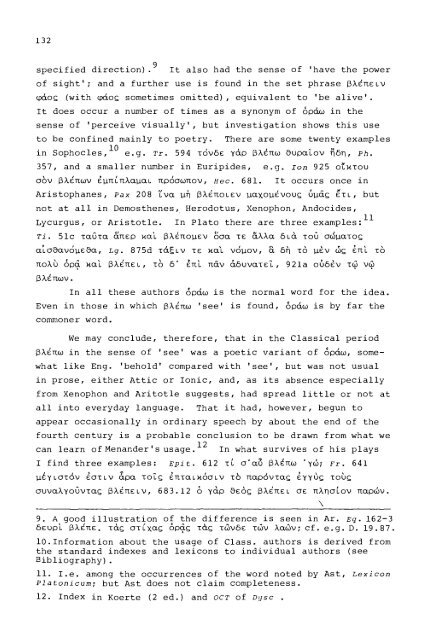A Lexical Study of the Septuagint Version of the Pentateuch
A Lexical Study of the Septuagint Version of the Pentateuch
A Lexical Study of the Septuagint Version of the Pentateuch
You also want an ePaper? Increase the reach of your titles
YUMPU automatically turns print PDFs into web optimized ePapers that Google loves.
specified direction). It also had <strong>the</strong> sense <strong>of</strong> 'have <strong>the</strong> power<br />
<strong>of</strong> sight"; and a fur<strong>the</strong>r use is found in <strong>the</strong> set phrase βλέπειν<br />
ψάος (with ψάος sometimes omitted), equivalent to "be alive".<br />
It does occur a number <strong>of</strong> times as a synonym <strong>of</strong> όράω in <strong>the</strong><br />
sense <strong>of</strong> 'perceive visually", but investigation shows this use<br />
to be confined mainly to poetry. There are some twenty examples<br />
in Sophocles, e.g. Tr. 594 τόνοε γαρ βλέπω θυραίον ήδη, Ph.<br />
357, and a smaller number in Euripides, e.g. ion 925 οίκτου<br />
σον βλέπων έμπίπλαμαι πρόσωπον, Hec. 681. It occurs once in<br />
Aristophanes, Pax 208 ϊνα μή βλέποιεν μαχόμενους υμάς ετι, but<br />
not at all in Demos<strong>the</strong>nes, Herodotus, Xenophon, Andocides,<br />
Lycurgus, or Aristotle. In Plato <strong>the</strong>re are three examples: ^<br />
Ti. 51c ταύτα απερ και βλέπομεν όσα τε άλλα δια τού σώματος<br />
α'ισθανόμεθα, Lg. 875d τάξιν τε και νόμον, α. δή τό μεν ώς έπί τό<br />
πολύ ορά και βλέπει, τό δ' έπί πάν αδυνατεί, 921a ουδέν τω νω<br />
βλέπων.<br />
In all <strong>the</strong>se authors όράω is <strong>the</strong> normal word for <strong>the</strong> idea.<br />
Even in those in which βλέπω 'see' is found, όράω is by far <strong>the</strong><br />
commoner word.<br />
We may conclude, <strong>the</strong>refore, that in <strong>the</strong> Classical period<br />
βλέπω in <strong>the</strong> sense <strong>of</strong> 'see' was a poetic variant <strong>of</strong> όράω, some<br />
what like Eng. 'behold' compared with 'see', but was not usual<br />
in prose, ei<strong>the</strong>r Attic or Ionic, and, as its absence especially<br />
from Xenophon and Aritotle suggests, had spread little or not at<br />
all into everyday language. That it had, however, begun to<br />
appear occasionally in ordinary speech by about <strong>the</strong> end <strong>of</strong> <strong>the</strong><br />
fourth century is a probable conclusion to be drawn from what we<br />
12<br />
can learn <strong>of</strong> Menander s usage. In what survives <strong>of</strong> his plays<br />
I find three examples: Epit. 612 τί σ'αδ βλέπω 'γώ; Fr. 641<br />
μέγιστόν έστιν αρα τοίς έπταικόσιν τό παρόντας εγγύς τους<br />
συναλγούντας βλέπειν, 683.12 ό γαρ θεός βλέπει σε πλησίον παρών.<br />
\<br />
9. A good illustration <strong>of</strong> <strong>the</strong> difference is seen in Ar. Eg. 162-3<br />
δευρί βλέπε, τάς στίχας οράς τάς τώνδε τών λαών; cf. e.g. D. 19.87.<br />
10.Information about <strong>the</strong> usage <strong>of</strong> Class, authors is derived from<br />
<strong>the</strong> standard indexes and lexicons to individual authors (see<br />
Bibliography).<br />
11. I.e. among <strong>the</strong> occurrences <strong>of</strong> <strong>the</strong> word noted by Ast, Lexicon<br />
Platonicum; but Ast does not claim completeness.<br />
12. Index in Koerte (2 ed.) and OCT <strong>of</strong> Dijsc .

















